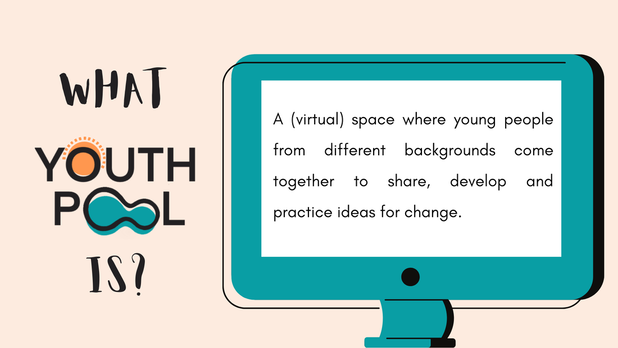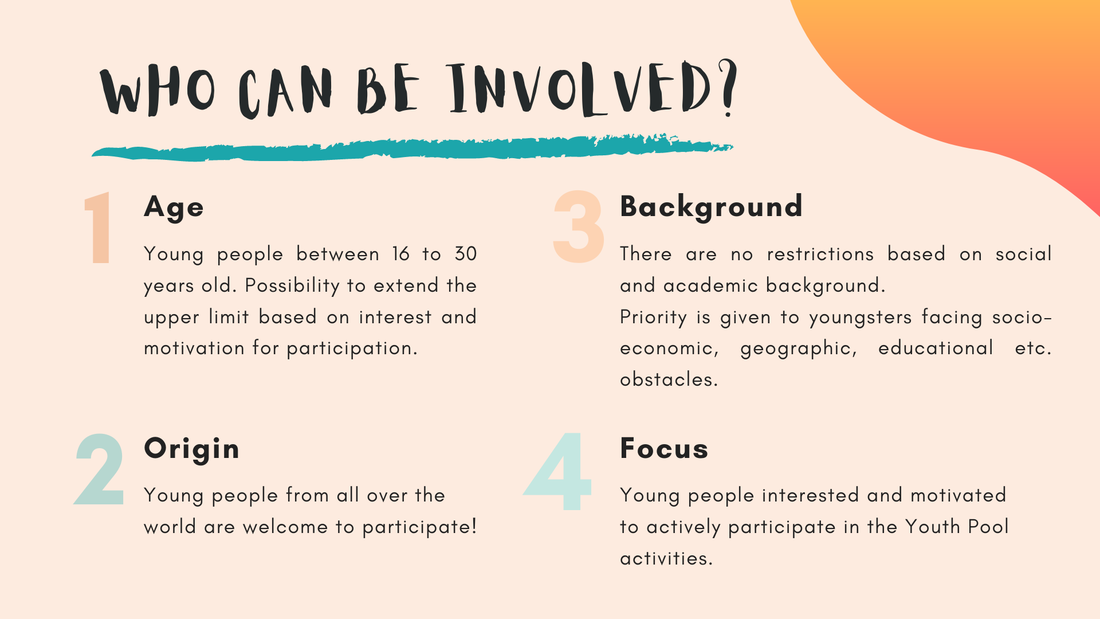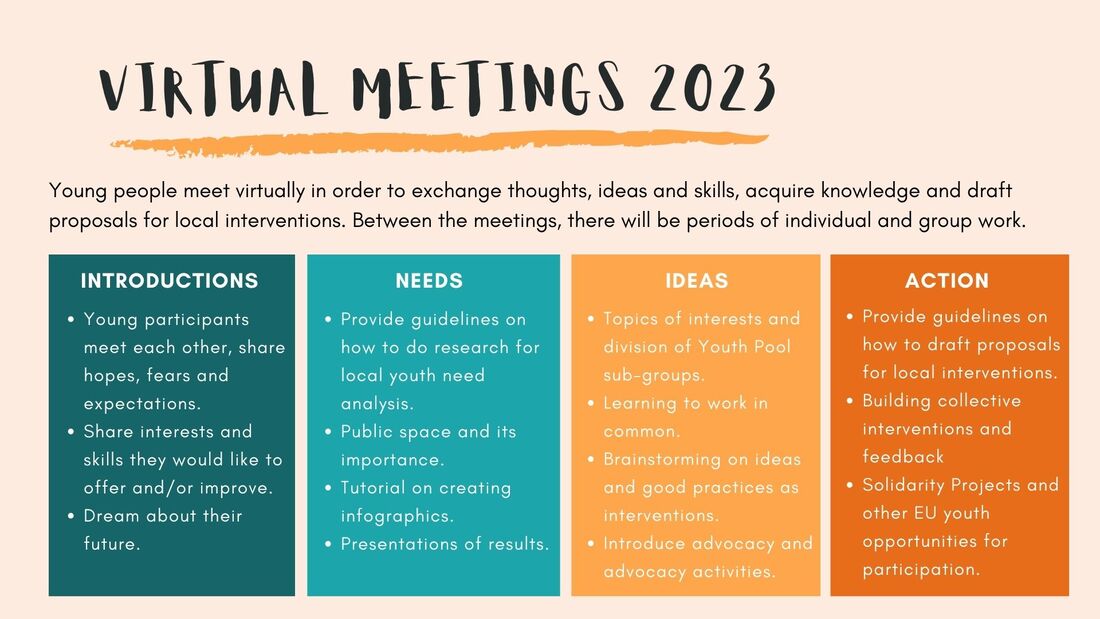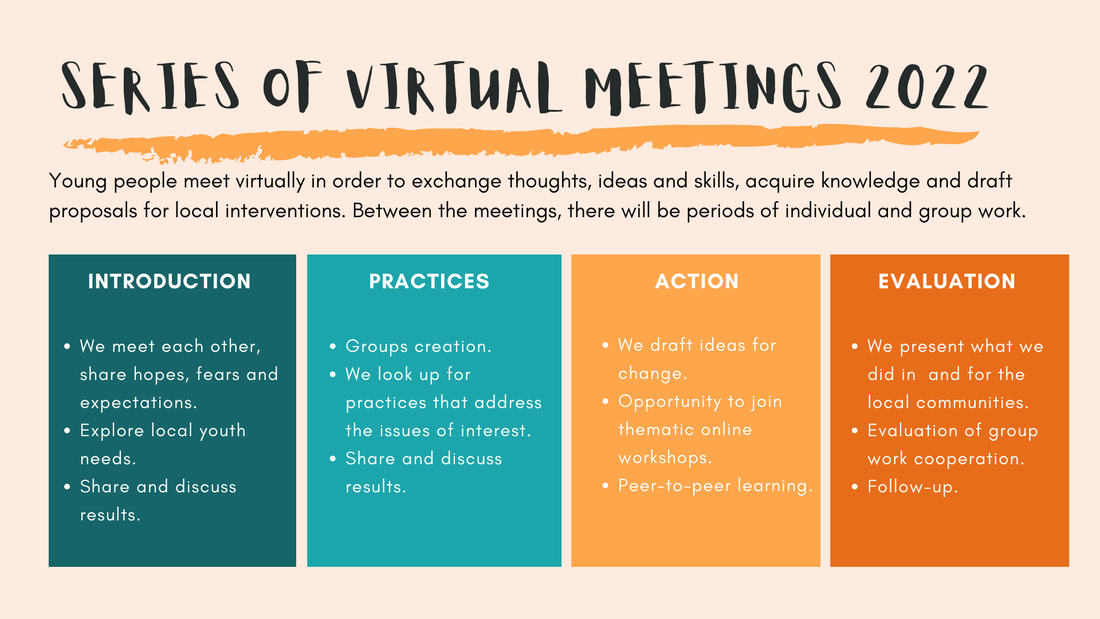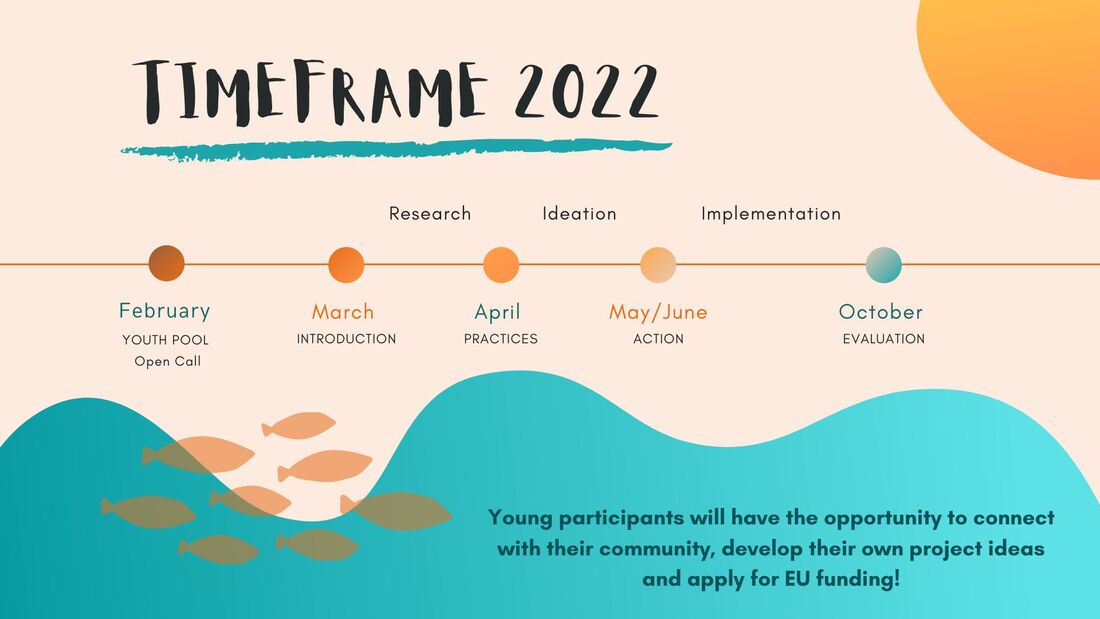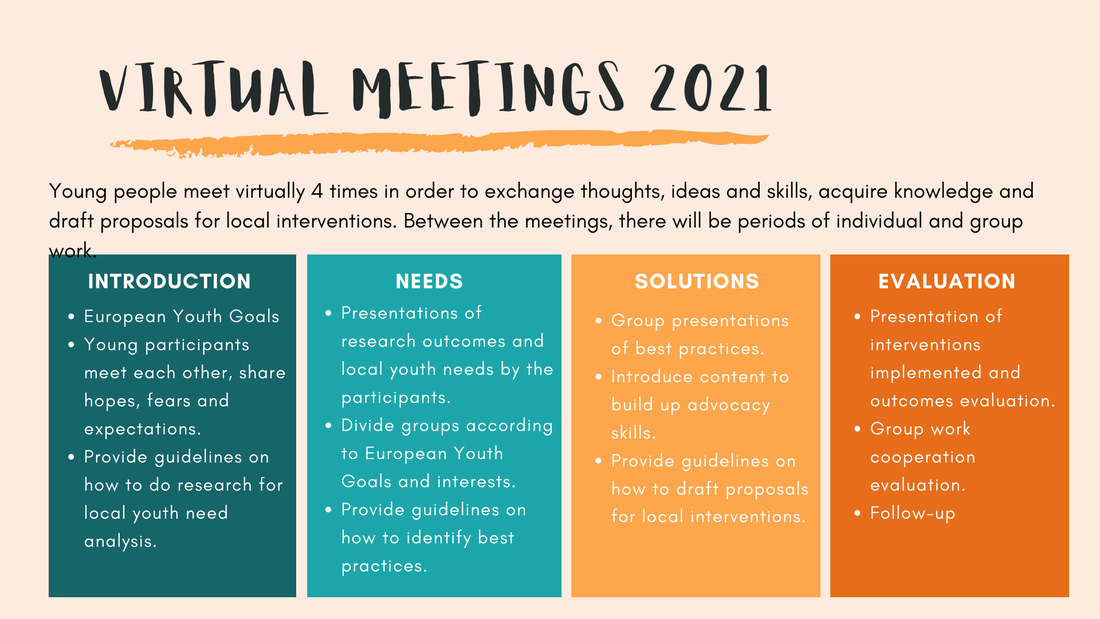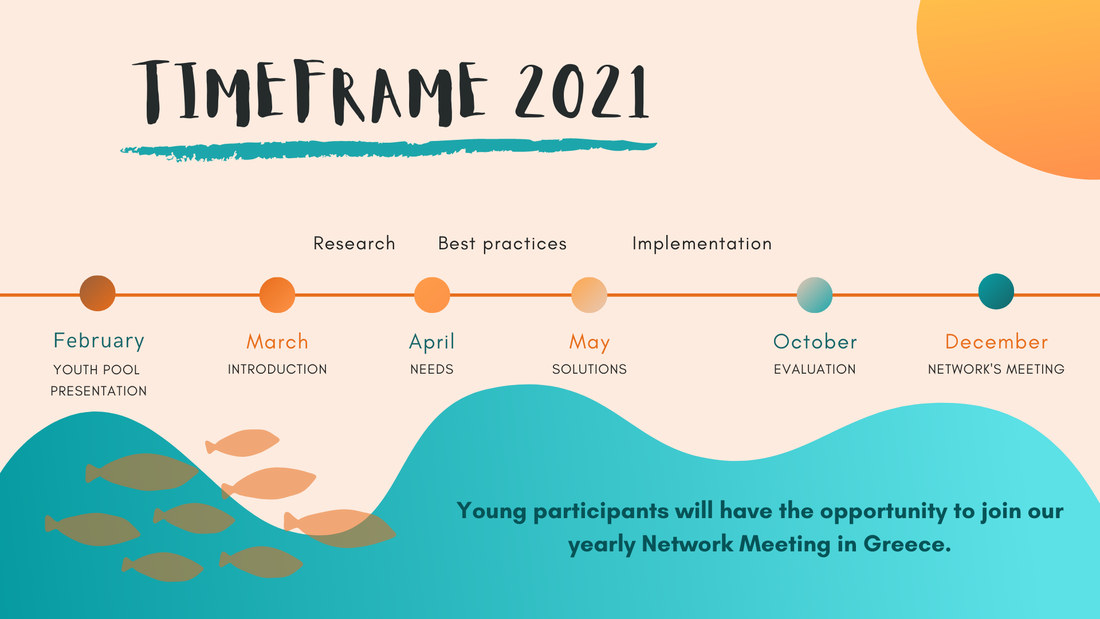“Youth Pool” is a global youth initiative launched by Inter Alia with the support of our network “A Partnership for Youth”.
It is a tool for youth empowerment that applies hybrid youth work (digital and physical) without geographic and socioeconomic limitations.
Participation is not only about voting once in a 4-5 years period. It is about contributing to the processes that affect our lives, starting with maintaining of the local playground for example and including schooling decisions, adoption or divorce proceedings, planning and implementation of youth policies and programmes, consultation and evaluation of policies of overall concern (environment, international relations, economy, etc.).
Spaces for Participation relate to the opportunities to exercise this right. This means facilitated access, engagement, motivation, acquisition and development of skills and competencies to negotiate and advocate for existing needs.
Young people are often represented by somebody else, with no or very limited space for self-expression and involvement. Youth policies at various levels are designed without consultation with the persons targeted, resulting in complete disconnection from the social, political, educational and other processes within their community.
The EU Youth Strategy (2019-2027) “fosters youth participation in democratic life, supports social and civic engagement and aims to ensure that all young people have the necessary resources to take part in society”. It focuses on three core areas of action:
The EU Youth Strategy and related activities contribute to achieving the 11 European Youth Goals that resulted from the 2017-2018 EU Youth Dialogue process. These goals represent multifaceted challenges affecting young people’s lives and aim at mobilizing cross-sectoral areas to address them.
Youth Pool foresees a series of non-formal (online) activities addressed to and organised by the young people, for the young people. Youth Pool invites young people from diverse backgrounds to come together to share, develop and practice their own ideas for change.
Youth Pool directly responds to the Youth Goal #9 on Space and participation for all. The goal identifies that “young people are underrepresented in decision-making processes which affect them although their engagement is crucial to democracy. They need access to spaces in their communities to support their personal, cultural and political development.” Such spaces are youth-friendly mechanisms and structures, physical or virtual that support participation and autonomy for the young people in all areas of society.
It is a tool for youth empowerment that applies hybrid youth work (digital and physical) without geographic and socioeconomic limitations.
- Background
Participation is not only about voting once in a 4-5 years period. It is about contributing to the processes that affect our lives, starting with maintaining of the local playground for example and including schooling decisions, adoption or divorce proceedings, planning and implementation of youth policies and programmes, consultation and evaluation of policies of overall concern (environment, international relations, economy, etc.).
Spaces for Participation relate to the opportunities to exercise this right. This means facilitated access, engagement, motivation, acquisition and development of skills and competencies to negotiate and advocate for existing needs.
Young people are often represented by somebody else, with no or very limited space for self-expression and involvement. Youth policies at various levels are designed without consultation with the persons targeted, resulting in complete disconnection from the social, political, educational and other processes within their community.
The EU Youth Strategy (2019-2027) “fosters youth participation in democratic life, supports social and civic engagement and aims to ensure that all young people have the necessary resources to take part in society”. It focuses on three core areas of action:
- Engage - meaningful civic, economic, social, cultural and political participation of young people.
- Connect - connections, relations and exchange of experience for solidarity and the future development of the European Union.
- Empower - encouraging young people to take charge of their own lives and address diverse challenges.
The EU Youth Strategy and related activities contribute to achieving the 11 European Youth Goals that resulted from the 2017-2018 EU Youth Dialogue process. These goals represent multifaceted challenges affecting young people’s lives and aim at mobilizing cross-sectoral areas to address them.
- What
Youth Pool foresees a series of non-formal (online) activities addressed to and organised by the young people, for the young people. Youth Pool invites young people from diverse backgrounds to come together to share, develop and practice their own ideas for change.
Youth Pool directly responds to the Youth Goal #9 on Space and participation for all. The goal identifies that “young people are underrepresented in decision-making processes which affect them although their engagement is crucial to democracy. They need access to spaces in their communities to support their personal, cultural and political development.” Such spaces are youth-friendly mechanisms and structures, physical or virtual that support participation and autonomy for the young people in all areas of society.
- How
Youth Pool is a process built on three basic principles:
- Relationships & Connections - Youth Pool gives time for relationships to grow among the participants that share common values, hopes, and visions, while at the same time are driven by common needs. It explores the differences between the young people considering these an asset to each separate relationship, while providing a safe space to debate, discuss and build on these differences.
- Hybridity of the methods - Youth Pool tries to utilise the possibilities that stem from digital connectivity to raise action for physical spaces. Youth Pool activities are both digital and physical in a way that young people who are interested and motivated will have the chance to participate and have their say on issues that matter to them.
- Promoting the bottom-up approach to participation - Youth Pool is a new proposal for youth participation. It is a response to the need to connect, share, build common visions and act.
Youth Pool 2023 *New*
Introductions – 31 March 14-15.30 CET
This will be an introductory meeting to get to know each other. We are going to use some interactive games and activities to reflect on our needs, expectations and dreams about the future.
Youth Needs Basics – 27 March 14-15.30 CET
During this meeting, you will learn how you could do research on youth (community) needs of your local community. You will be presented with tips and processes that could be helpful. You will be also introduced to the importance of public space and how public space could be used for your interventions. You will be assigned to an individual task on youth needs. There will be also a short tutorial on how to use Canva for presenting your own results in the form of an infographic.
Choosing a topic and group division – 19 April 14-15.30 CET
You will present your infographics and discuss the main outcomes of your research and youth needs analysis. Then, based on the topics of interest, Youth Pool sub-groups will be formed to go deeper into the issues, find commonalities and differences, brainstorm on ideas and good practices that might have been already implemented in their communities.
Building power together – 21 April 14-15.30 CET
In this meeting, you will learn the basics on advocacy, get inspired by advocacy activities examples and learn to think and act in common. Your task for the next time will be to build an actual idea for community intervention that addresses a need of your interest.
Ideas for change – 28 April 14-15.30 CET
During this meeting, each group will present a snapshot of their idea and receive collective feedback.
What could the EU do to support our ideas? – 19 May 14-15.30 CET
Finally, we will talk and share experiences on youth opportunities and ways of participation through the EU funding programs and institutions. We will explore, in particular, how we could apply for solidarity projects with our friends in our community.
Based on the thematic focus of each Youth Pool sub-group, special additional thematic workshops could be organized inspired by the principles and activities of Inter Alia.
Introductions – 31 March 14-15.30 CET
This will be an introductory meeting to get to know each other. We are going to use some interactive games and activities to reflect on our needs, expectations and dreams about the future.
Youth Needs Basics – 27 March 14-15.30 CET
During this meeting, you will learn how you could do research on youth (community) needs of your local community. You will be presented with tips and processes that could be helpful. You will be also introduced to the importance of public space and how public space could be used for your interventions. You will be assigned to an individual task on youth needs. There will be also a short tutorial on how to use Canva for presenting your own results in the form of an infographic.
Choosing a topic and group division – 19 April 14-15.30 CET
You will present your infographics and discuss the main outcomes of your research and youth needs analysis. Then, based on the topics of interest, Youth Pool sub-groups will be formed to go deeper into the issues, find commonalities and differences, brainstorm on ideas and good practices that might have been already implemented in their communities.
Building power together – 21 April 14-15.30 CET
In this meeting, you will learn the basics on advocacy, get inspired by advocacy activities examples and learn to think and act in common. Your task for the next time will be to build an actual idea for community intervention that addresses a need of your interest.
Ideas for change – 28 April 14-15.30 CET
During this meeting, each group will present a snapshot of their idea and receive collective feedback.
What could the EU do to support our ideas? – 19 May 14-15.30 CET
Finally, we will talk and share experiences on youth opportunities and ways of participation through the EU funding programs and institutions. We will explore, in particular, how we could apply for solidarity projects with our friends in our community.
Based on the thematic focus of each Youth Pool sub-group, special additional thematic workshops could be organized inspired by the principles and activities of Inter Alia.
Timeline 2022
In a period of 6 months, the Youth Pool participants explore the challenges in their community, meet people from all over the world, share knowledge and experiences, connect and collaborate with the local community and implement local interventions to advocate for youth rights and change.
Youth Pool includes a series of virtual meetings (each one building on the achievements of the previous) including non-formal activities, team work, expert consultation, and field work:
1. Introduction: 10 & 24 March, 15.00-16.30 CET
We meet for the first time to get to know each other and explore the needs, habits and preferences of local youth. We share tools on better researching these needs and share our discoveries. We split into working groups based on their interests.
2. Practices: 5 & 19 April, 15.00-16.30 CET
We split into working groups based on their interests. We learn how to look up for practices and policies related to the issues of our interests. We share and discuss the results identifying key points and elements that work in our local and thematic context.
3. Action: May/June – TBC
We draft our ideas for change and become more community active. We join online workshops such as critical thinking, project writing, tools for advocacy and political participation. We identify knowledge gaps and needs for further skills development.
4. Evaluation: 14 October, 15.00-16.30 CET
We present our activities and projects we did in our community. We evaluate the process of team work and the outcomes of these interventions.Young people are going to connect with other young people, engage with their local communities and get empowered to envision and work for a desired change.
In a period of 6 months, the Youth Pool participants explore the challenges in their community, meet people from all over the world, share knowledge and experiences, connect and collaborate with the local community and implement local interventions to advocate for youth rights and change.
Youth Pool includes a series of virtual meetings (each one building on the achievements of the previous) including non-formal activities, team work, expert consultation, and field work:
1. Introduction: 10 & 24 March, 15.00-16.30 CET
We meet for the first time to get to know each other and explore the needs, habits and preferences of local youth. We share tools on better researching these needs and share our discoveries. We split into working groups based on their interests.
2. Practices: 5 & 19 April, 15.00-16.30 CET
We split into working groups based on their interests. We learn how to look up for practices and policies related to the issues of our interests. We share and discuss the results identifying key points and elements that work in our local and thematic context.
3. Action: May/June – TBC
We draft our ideas for change and become more community active. We join online workshops such as critical thinking, project writing, tools for advocacy and political participation. We identify knowledge gaps and needs for further skills development.
4. Evaluation: 14 October, 15.00-16.30 CET
We present our activities and projects we did in our community. We evaluate the process of team work and the outcomes of these interventions.Young people are going to connect with other young people, engage with their local communities and get empowered to envision and work for a desired change.
Timeline 2021
We foresee 4 virtual meetings (each one building on the achievements of the previous) including non-formal activities, team work, expert consultation, and filed work:
We foresee 4 virtual meetings (each one building on the achievements of the previous) including non-formal activities, team work, expert consultation, and filed work:
- Meeting No. 1 (March 2021): Team building and aims
- Meeting No. 2 (April 2021) – Needs
- Meeting No. 3 (May 2021) – Solutions
- Meeting No. 4 (October 2021) – Evaluation
Do you want to learn more about Youth Pool?
Check out our video presentation of Youth Pool 2021!
Find the presentation of Youth Pool 2021 here.
Check out the FAQ section.
Apply for Youth Pool 2023 here!
For more information, contact Amerissa Giannouli at [email protected] .
Graphics by Bálint Boróka
Check out our video presentation of Youth Pool 2021!
Find the presentation of Youth Pool 2021 here.
Check out the FAQ section.
Apply for Youth Pool 2023 here!
For more information, contact Amerissa Giannouli at [email protected] .
Graphics by Bálint Boróka

